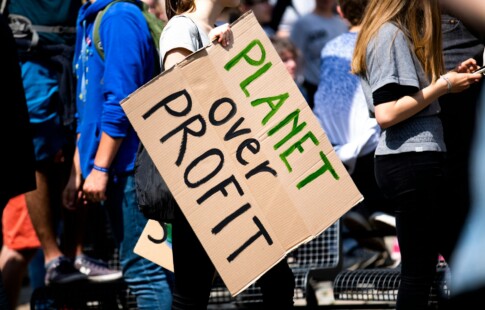
Tote Bag vs. Plastic Bag: From an Environmental POV
We are reader-supported. When you buy through links on our site, we may earn affiliate commission.
Single-use plastic bags efficiently hold our groceries and items when shopping. But should we trade environmentally sound practices for this efficiency? The tote bag vs. plastic bag debate is more than just about efficiency and convenience. Here are some things to consider when choosing the right bag for your shopping needs.
Tote Bag vs. Plastic Bag: A Closer Comparison
If you’ve ever gone shopping for groceries or other personal items, you’d know how many plastic bags people can consume in one day. On average, Americans use one plastic bag daily to carry goods. It’s easy to imagine how much that contributes to landfills and pollution in the long run.
Single-Use Plastics
Single-use plastics were designed to make buying goods efficient and convenient. After all, you can dump the plastic bags once you’re done shopping. However, that mentality is what exacerbates the plastic pollution problem. People are so used to grabbing plastic bags from stores and throwing them away without a second thought.
The world produces about 300 million tons of plastic annually. Half of that is turned into single-use plastics. These plastic bags often get blown away by the wind and find their way into streets as litter or, worse, into our oceans.
According to the World Economic Forum, 75 to 199 million tons of plastic waste pollute our oceans. That number is expected to triple by 2040 as the demand for plastics increases. The world’s plastic problem quickly turned into an environmental one.
Plastic pollution is responsible for the following:
- Injuring and killing marine life
- Microplastics in food and water
- Litter on coastlines affects tourism and various ecosystems
- Reduced production of fisheries
Reusable Totes
People trying to move away from single-use plastics realize they must find an alternative. They switch from plastic bags to reusable totes to become more sustainable as tote bags are typically made with stronger, more durable materials.
Reusable totes look like an easy choice for mindful shoppers who want to cut their total carbon footprint. After all, these bags are not made with plastic and can be used repeatedly. As these bags are made with robust materials, they last much longer than conventional plastic bags.
In addition, tote bags are sometimes made with recycled cotton and polyester to make them more eco-friendly and improve the material’s quality. This is good for the environment as using recycled materials can help lessen the load of landfills and reduce the amount of waste headed for incineration.
Shopping Bag Choices: It’s Complicated
However, the tote bag vs. plastic bag discussion becomes complex as more factors come into play. Since tote bags are made with different materials, they consume more energy than single-use plastics. This means they have a bigger carbon footprint and can require more natural resources to produce.
Is Reusable Always Better?
For example, cotton bags are more durable than conventional totes. But are they necessarily better? According to the Life Cycle Assessment (LCA), the average canvas bag is equivalent to 700 single-use bags if maximized until the end of its life span. The LCA computes the total energy required to produce an item and its environmental consequences.
The analysis considers everything from the procurement of materials, processing and manufacturing of the product to packaging, transportation, distribution, usage, recycling and disposal. It’s a lengthy process but helpful in understanding sustainable products’ possible environmental impacts.
Canvas totes require more than 130 uses to offset their energy consumption, while it takes up to 20,000 uses for organic cotton bags. It can be difficult to imagine how cotton bags can be this bad for the environment, but the science checks out.
Cultivating organic cotton takes a lot of land, water, and resources. To offset the effects of organic cotton production, it only makes sense to use the finished product many times in its life span. One way to alleviate this issue is to use conventional or recycled cotton, as these variants consume considerably less materials and resources to manufacture.
Plastic Not So Fantastic
While other bag materials consume more energy and materials to produce, they are nowhere near the environmental damage of single-use plastics. Plastic bags are indeed easier and more cost-effective to manufacture. Still, they are one of the top causes of pollution worldwide.
This has led countless cities, states and countries to impose plastic bans. These plastic bans aim to reduce the amount of plastic waste coming from consumer practices and commercial processes. However, more problems arose from the solution as groceries and other establishments sought alternatives for their packaging needs.
Heavier plastic bags are not technically single-use plastics due to their durability. They can also be reused repeatedly but almost always end up in the same landfills once they reach the end of their life span.
As these bags are made with heavier materials, they take longer to disintegrate. Some plastic materials are known to have a 500-year life span until they fully decompose. A landfill mainly composed of those materials is like nightmare fuel for environmentalists.
Tote Bag vs. Plastic Bag: Final Verdict
While tote bags are made with heavier materials that consume more energy and can have a higher initial carbon footprint, continuous and repeated use can offset their negative environmental impact. Here are some tips for frequent shoppers who want to contribute to better and more sustainable practices:
- Always bring reusable bags to maximize their usage.
- Refrain from patronizing single-use plastics while shopping.
- Patronize recycled goods like shopping bags made with recycled materials.
- Reuse existing plastic bags in the household as liners for trash bins.
- Secure plastic waste for proper disposal.
- If possible, buy only what you need, including shopping bags.
- Reduce consumption of products that produce a lot of disposable waste.
On the other hand, governments and businesses can improve current policies and business practices to help combat plastic pollution. Some recommendations include:
- Create more clear-cut policies on plastic use for businesses.
- Incentivize shoppers who reuse plastics and other bags when shopping.
- Impose a higher tax on the use of excess plastic packaging.
- Create more recycling-oriented policies to encourage more sustainable practices.
- Encourage shoppers and businesses to be more mindful of plastic waste.
- Penalize organizations that are repeat offenders of environmental laws, especially regarding excessive production and improper disposal of plastic waste.
Governments, businesses and citizens should rally behind the common goal to reduce plastic use. Combined efforts will help eliminate the patronization of single-use plastics and create a more mindful society towards responsible consumption.
Share on
Like what you read? Join other Environment.co readers!
Get the latest updates on our planet by subscribing to the Environment.co newsletter!
About the author
Maria Visser
Maria serves as the Assistant Editor of Environment.co. A true foodie and activist at heart, she loves covering topics ranging from veganism to off grid living.





